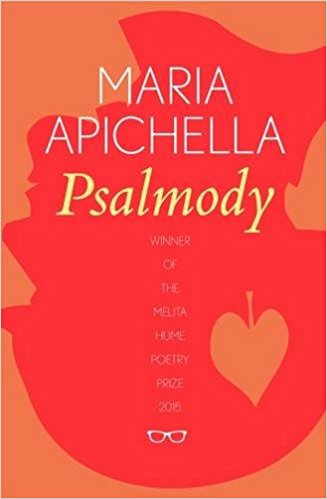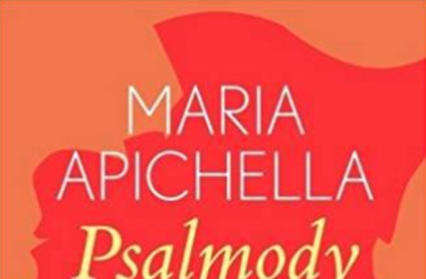Carla Manfredino reviews Psalmody by Maria Apichella, a thoughtful and refreshing collection illustrating the often trivial aspects of love and religion.
Reading Maria Apichella’s poems in Psalmody, I was reminded of the Jesus & Mary Chain song, ‘Just like Honey’. The title is an apt description of the book; it leaves a sticky, sweet residue long after reading. Apichella has a unique way of poeticising trivial gestures where love is concerned, ‘We click still./ A net curtain moves’. When her imagery is right, it is perfect in its obliquity: ‘I look goodbye/ into your Autumn face’ and, ‘The flushed evening/ melts into the sea,/ fades to a duck egg dawn’. The fragments have a covert musicality, with subtle inner rhymes and sibilance sharpening the claustrophobia of obsessive love: ‘Who wants an absent partner, tense’.
 The everyday acquires profundity in the book. Hands that have ‘formed meatballs,/ unlocked doors, picked up onion skins/ from [the] kitchen floor’ are the hands of a pilgrim. Elsewhere, at a party, the smokers are ‘silhouetted like saints’ and ‘a couple/ neck in the corner’. Articles associated with transubstantiation appear in different contexts in the poems. For instance, the ‘freshly broken bread’ reappears later as the simile ‘breaks us in half like a baguette’. After a meal of chicken and red wine, the speaker and David ‘lean against the table’s raft’. Food is the saviour here, returning the speaker to simplicity and necessity. Just as food provides sustenance, it binds the fragments together and creates space in the otherwise intense atmosphere:
The everyday acquires profundity in the book. Hands that have ‘formed meatballs,/ unlocked doors, picked up onion skins/ from [the] kitchen floor’ are the hands of a pilgrim. Elsewhere, at a party, the smokers are ‘silhouetted like saints’ and ‘a couple/ neck in the corner’. Articles associated with transubstantiation appear in different contexts in the poems. For instance, the ‘freshly broken bread’ reappears later as the simile ‘breaks us in half like a baguette’. After a meal of chicken and red wine, the speaker and David ‘lean against the table’s raft’. Food is the saviour here, returning the speaker to simplicity and necessity. Just as food provides sustenance, it binds the fragments together and creates space in the otherwise intense atmosphere:
‘I will not demand.
He cannot give.
I dice chicken breast,
Red peppers, garlic.
What he cannot change
I’ll not demand.’
‘60’.
There are echoes of John Berryman’s Dreamsongs in the claustrophobic atmosphere, the tone and form. Apichella’s ‘I am frenetic/ blue; tension under a cool-headed guise’ is reminiscent of Berryman’s: ‘I am, outside. Incredible panic rules.’ (Dreamsong ‘46’). Just as Mr. Bones is the man Henry addresses in the Dreamsongs, bones are a frequent feature in Psalmody: ‘his heavy bones’, ‘I was those bones’, ‘David,/ your shoulder bone hurts me.’ and the significant ‘We’re made of bones like nerve endings’.
The subtle says more about the speaker’s emotions than the explicit. For example, ‘I’m thirsty as earth in high summer’, ‘You fill all that can be filled’ and ‘I was designed for your rescue’ are clichéd and obvious. The magic is in Apichella’s observations of the banal. The poured honey at the beginning of the book, ‘like dense sunlight’, resurfaces in various guises throughout the book. The repetition of imagery never dulls, just as ancient religious doctrines and morals are applicable to us today. Apichella shows we can never truly know something; even concrete everyday objects can mutate, depending on the viewer’s projection.
Psalmody has an incredible variation of form- each poem contains a new world that is built on the previous in a disjointed way. Non sequitur replaces disclosure: ‘How I reared my head, stomped my feet,/ galloped headlong into a pile of-/ At night I imagine terrible things’. The fragments are at their best when they concentrate on the concrete, and instigate deeper meanings for the reader to ponder. The gaps between words don’t always work but when they do, they distil the moment:
‘Corn-stubble face
looking at me
curious.
A full presence –
like the song he sings
expansive as tributaries
makes me shell target bird’
‘2’.
The speaker struggles with her own beliefs and David’s atheism. In the oneiric dream ‘41’, she asks ‘why can’t the Bible be a manual, a systemic list?’. In the end it all becomes the same: ‘I’ll carry God/ David/ into my un-shaped days.’ The ‘unseen force’ the speaker hopes for is the sacred, the unattainable, the ‘Truth’.
The speaker sometimes addresses David personally, and at other times in the third person. Just as the being we love can become a concept, ubiquitous and deified. The book begins and ends with the speaker driving to Bala, mirroring the circuity of the age-old conflicts of love and faith. True love never really ends. Just as the ‘Toast-flecked honey’ is irrevocable, once real love has entered one’s life, its presence cannot be easily removed.
Maria Apichella has also written for Wales Arts Review about her process when writing Psalmody.











